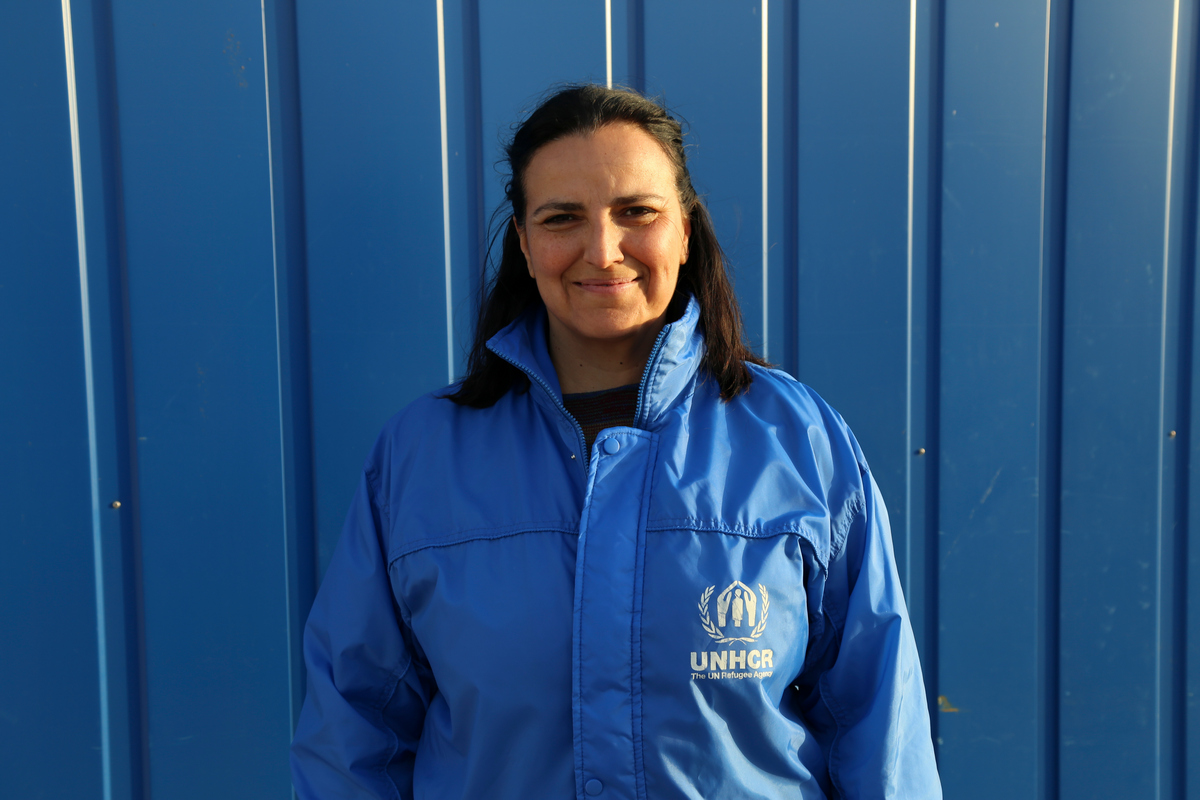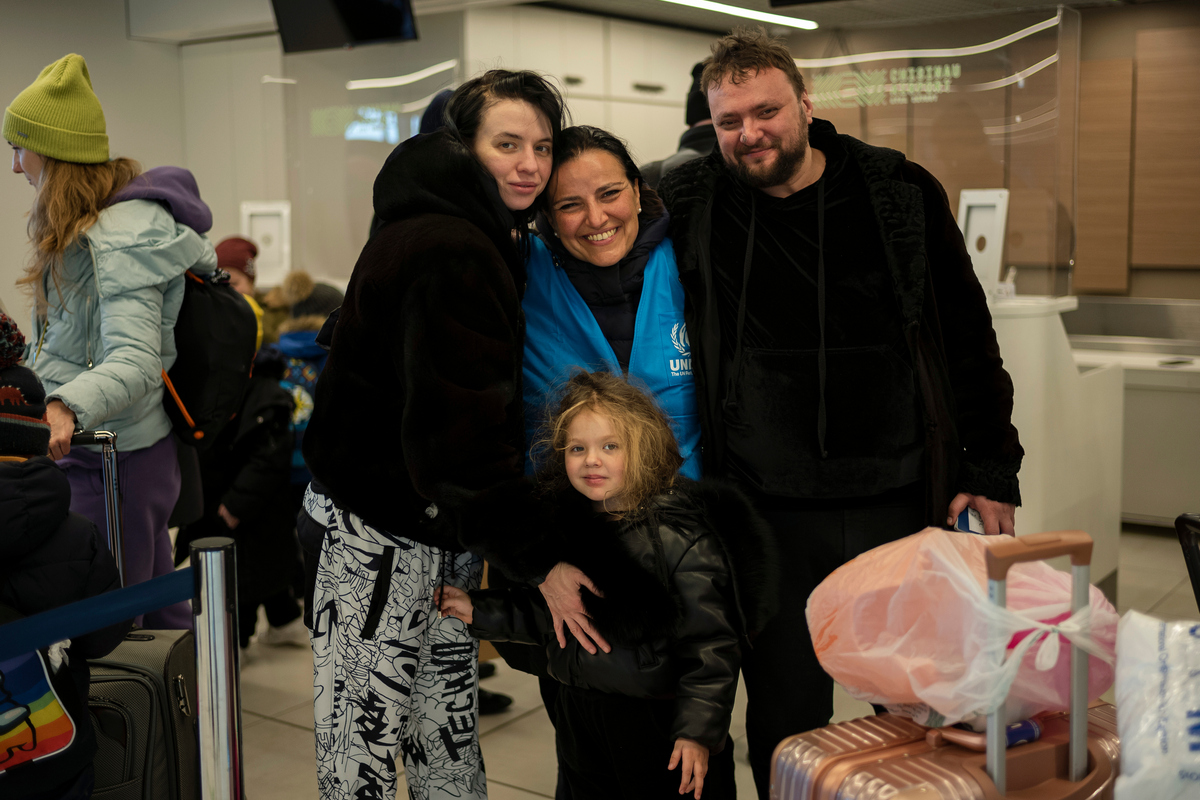A letter from Moldova written by Francesca Bonelli, UNHCR Representative in Moldova.

It was not going to be easy. I knew it right from the beginning when I received a call from the Senior Management asking me to go on a mission to Moldova, initially for two months, as an ad-interim Representative of UNHCR, the UN Refugee Agency.
Since the onset of the crisis in Ukraine, the whole world’s attention had been mainly focused on developments in Eastern Europe. Being a UNHCR staff member who has devoted her entire professional life to supporting refugees worldwide, images of people leaving their homes in despair were even more heart-wrenching to watch.
UNHCR’s response was immediate and robust, with colleagues from around the world being massively deployed to help displaced people from and within Ukraine. Also, the UNHCR Serbia team, in close cooperation with local authorities, moved fast to have everything set up on time for the prospective influx of Ukrainian refugees.
However, I somehow felt that it was not only my professional duty but also an inner call as a humanitarian that urged me to be with refugees on the ground. I have been on many UNHCR emergency missions and one thing I was certain of was that whenever wars broke out, people forced to flee are in desperate need of any possible assistance. UNHCR, as guardian of the Refugee Convention, is standing by refugees’ side at any time, and in support of receiving countries.
Afterwards, everything felt like a time-lapse movie. I had just a few days to pack only the most needed belongings, do a quick handover to my deputy at UNHCR Serbia, and say goodbye to my friends.

By the time I’d learned about my deployment to Moldova I did not know much about this country. What I managed to discover in the meantime was barely enough to prepare me for reality on the ground. Thousands of refugees were crossing the Ukraine-Moldova border in search of safety, every day. These numbers would be an overwhelming challenge even for countries with much stronger economies than Moldova’s.
This reminds me a lot of Serbia, and the support Serbian people have shown over the years to all refugees, irrespective of their origin, religion, or political beliefs.
The most heartbreaking scenes were the separations between men and their families that I saw during the first days at the border. I saw broken families and many women in tears, greeting their children, husbands, and fathers who accompanied them to the border and then returned to Ukraine. Desperate hugs, with no certainty of seeing each other again. Witnessing these tears first-hand makes you immediately realize what a terrible thing war is.
By 24 February, when the war broke out, UNHCR’s presence in Moldova comprised one colleague only. And then everything changed dramatically, propelling the necessity for intensive UNHCR intervention on the ground. Our team in Moldova was set up quickly, and we immediately started to help refugees, and provide support to the authorities.

However, the additional sensitivity UNHCR and other humanitarian agencies have faced on the ground was the fact that almost half of the refugees from Ukraine are children. So, with our partners, we have rolled out the system of ‘Blue Dots’, and interestingly this concept was developed for the first time in 2016 for the Western Balkan refugee route. The ‘Blue Dots’ are one-stop-shops and safe spaces that provide a minimum set of protection services for children, families, and others with specific needs, in support of existing services and government efforts. After days of travelling, children arrive exhausted and afraid, and they must find safety, video games, and music for their leisure time.
Also, UNHCR together with its partners supports the Government of Moldova in managing the refugee influx by providing services such as cash assistance, transportation, and accommodation, EU Air Transfers, family reunification assistance, protection services, and provision of the core relief items. On the border with Ukraine, we monitor whether there are vulnerable people, such as unaccompanied minors and we work to prevent human trafficking. We stay alert to any possibility of the risk of abuse. We stay also by providing direct economic assistance, a fundamental tool that allows refugees to provide for essential expenses, and that is also important to support the local economy.
But there is still paramount work ahead of us. The Government of Moldova has shown exceptional solidarity and openness to refugees, and UNHCR and I are personally thanking them for that from the bottom of our hearts. Moldova is the only non-EU country on the frontline of the Ukrainian refugee crisis, and it is facing challenges of additional expenses to guarantee refugees medical care and education. This commitment must be supported by all relevant actors. However, it is also an investment, because refugees are subject to assistance only immediately after they have fled, and later on, when provided with a chance to work and use their skills and knowledge, they give back to host countries and those who have welcomed them.

The story of Moldova and refugees bears the potential of becoming a successful one. It is a stark reminder that opening arms to people who have lost everything, in their hour of need, is not just everyone’s moral or legal obligation. It is also an opportunity to benefit from the immense human capital they are taking with them.
This reminds me a lot of Serbia, and the support Serbian people have shown over the years to all refugees, irrespective of their origin, religion, or political beliefs. After almost two years in Belgrade as a UNHCR Representative and the earlier time I had spent there during the 2015 refugee crisis, I feel at home in Serbia.
I will miss this beautiful country and all the wonderful people I met during my Serbian journey. I want to express my deep thanks to all of them for the support given to refugees and for the precious friendship they have always expressed to me.
Ukraine refugee numbers in Moldova
Since the escalation of the war in Ukraine, over 521,549 refugees from Ukraine arrived in the Republic of Moldova. While most of them have departed to other countries, there are over 83,000 remaining in the country. As of 5 July, 65,427 refugees received cash assistance, the fourth round of cash assistance commenced in July. UNHCR’s partner ACTED, provides transportation services, from the border crossing points to other destinations inside Moldova. Over 11,149 refugees have been transported from Palanca to Husi, Romania in collaboration with IOM. Under the EU Solidarity Platform, UNHCR together with IOM has assisted over 1,600 vulnerable refugees to relocate to EU countries. Refugees remaining in the country are mostly hosted by the welcoming Moldovan families, while some 3,100 refugees have chosen to stay in Refugee Accommodation Centres, managed by the Government. There are currently 72 active RACS having a total capacity of 6,000 and 2,900 available places. UNHCR manages a Green Line which addresses refugees’ queries and makes referrals. The information is available as well on the UNHCR Help Page which is constantly updated with information in Ukrainian, Russian, Romanian and English languages. Over 70,000 flyers, posters, and other informative materials focusing on protection issues have been distributed in the community. Vulnerable refugees can as well receive information and support in Blue Dots managed by UNHCR and UNICEF. So far, there are over 17,210 supported refugees, of whom over 8,470 are children. Additionally, over 1,120 frontline responders have been trained on protection issues including Child Protection, GBV, Anti-Trafficking, and other protection issues.